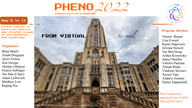Speaker
Description
We introduce a minimal and complete basis of subjets for machine learning-based jet tagging. The momenta, relative angles, and masses of the identified subjets are taken as input to a neural network. By adjusting the subjet radius, we can control the sensitivity to nonperturbative physics. We construct permutation invariant neural networks, Jet Flow Networks (JFN), which take as input the momenta and angles of the subjets. The basis introduced here is ideally suited to (i) systematically explore differences between a complete and overcomplete basis of observables that are taken as input to a machine learning architecture, and (ii) to quantify the information content of jets at the boundary of perturbative and nonperturbative physics. We demonstrate these aspects for quark vs. gluon and proton-proton vs. heavy-ion jets. The subjet basis introduced here exhibits a close connection to observables that are tractable in perturbative QCD, and we foresee applications for searches of physics beyond the Standard Model.

